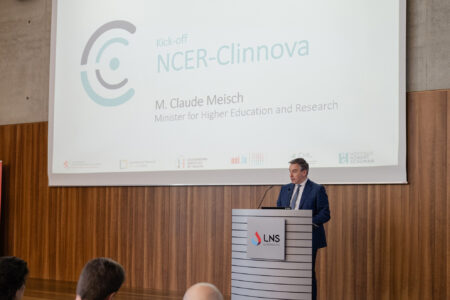 Artificial intelligence (AI) has huge potential to enhance healthcare but its implementation faces challenges, notably in the context of data enabling and the ability to build appropriate clinical studies. The objective of the Clinnova project, which is supported by the Luxembourg National Research Fund (FNR), the Grand Est Region in France, the Swiss Canton of Basel and the German State of Baden-Württemberg, is to foster AI-driven precision medicine via data federation, standardization, and interoperability.
Artificial intelligence (AI) has huge potential to enhance healthcare but its implementation faces challenges, notably in the context of data enabling and the ability to build appropriate clinical studies. The objective of the Clinnova project, which is supported by the Luxembourg National Research Fund (FNR), the Grand Est Region in France, the Swiss Canton of Basel and the German State of Baden-Württemberg, is to foster AI-driven precision medicine via data federation, standardization, and interoperability.
Advancing precision medicine
To date, there are no straightforward methods available to decide which drug to prescribe to which patient. With new drugs coming on the market in a steady flow, physicians and patients are faced with a concrete problem: the wrong therapy may aggravate the disease and incur unnecessary cost for the social system. Clinnova was conceived as a precision medicine initiative that tackles these challenges on three levels.
Clinnova primarily focuses on generating benefits for patients and physicians regarding three diseases: inflammatory bowel disease, rheumatoid diseases and multiple sclerosis. With an emphasis on data quality and standardisation, the goal is to develop effective AI algorithms that can support physicians in prescribing the right drug to an individual patient at the right time. Furthermore, these data can accelerate translational research into disease causes, which can further affect patient care.
We envision that in a data-enabled environment, the translation and application of biomedical research towards patients will become a seamless routine process.
Clinnova will also bridge the worlds of biomedical research and healthcare by fostering critical infrastructure development in Luxembourg. It will undertake the necessary steps to assure data interoperability and integration in this infrastructure concept.
Finally, Clinnova will federate precision health data across borders. The Clinnova team in Luxembourg has teamed up with universities and clinical centres in Baden-Württemberg in Germany, the Grand Est region in France, and the region of Basel in Switzerland to invest in similar Clinnova precision health programmes and link the IT infrastructures set up. The Clinnova partners are thus building a federated precision health network across Europe.
Artificial intelligence solutions for healthcare
Overall, AI-driven solutions for healthcare require both infrastructure investment and coordination between clinical institutions. “We envision that in such a data-enabled environment, the translation and application of biomedical research towards patients and their unmet needs will become a seamless routine process,” says Dr Jasmin Schulz, chief coordinator of Clinnova at the Luxembourg Institute of Health. The project’s stakeholders also believe that translational research initiatives focused on patients will evolve to become a major driver for fundamental research, thereby increasing the amount of therapeutic possibilities for patients in the future.
Clinnova will significantly contribute to Luxembourg’s research environment and the expansion of its positive image throughout the world.
“By leveraging data federation, standardisation and interoperability, Clinnova is poised to foster AI-driven precision medicine at an unprecedented scale,” comments Claude Meisch, Minister of Higher Education and Research. “By utilising international and interdisciplinary expertise anchored within the national priority of personalised healthcare, the project fully aligns with the Luxembourg National Research and Innovation Strategy. Clinnova will significantly contribute to Luxembourg’s research environment and the expansion of its positive image throughout the world.”
Photo credits: Luxembourg Institute of Health

